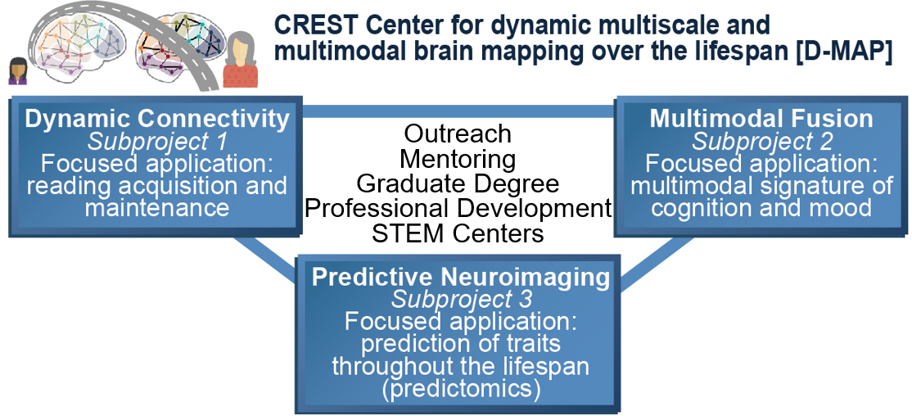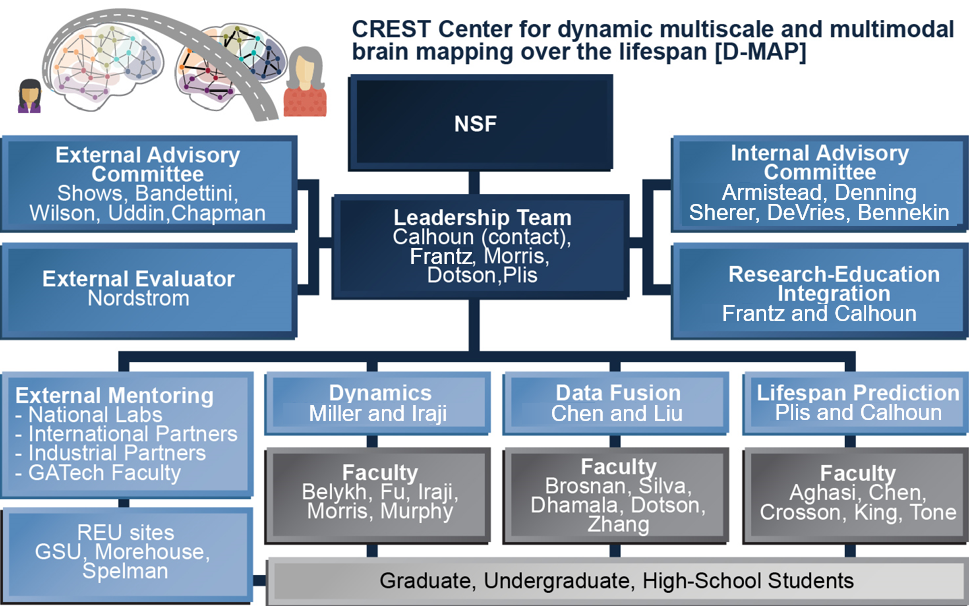The Georgia State University (GSU) center for dynamic multiscale and multimodal brain mapping across the lifespan [D-MAP] integrates investigators from 12 departments/programs and 5 colleges/schools across the university, focusing on highly interdisciplinary topics in areas from neuroscience to computer science to biomedical enterprise.
Together, we will address one of the greatest challenges we face today, uncovering the link between brain and behavior across the lifespan with the following subprojects.

Unimodal Brain Dynamics
We are developing methods to advance our understanding of time-varying brain connectivity (i.e. chronnectomics1) and the evolution of whole brain connectivity patterns over time (i.e., from milliseconds to seconds to minutes to years).
Multimodal Data Fusion
We are developing novel methods to lead the field in multivariate approaches to model linked changes in multi-modal measures and their trajectories over the lifespan. Key contributions we propose include 1) the incorporation of network subspaces (e.g. different subsets of modalities and networks show different behavior), 2) flexible approaches to identify links between data with mismatched dimensionality, e.g. brain function and structure, and 3) the development of multimodal models that leverage deep learning to capture more complex (potentially nonlinear) relationships. Initial emphasis will be on multimodal MRI and EEG/MEG data.
Predictive Neuroimaging
We are utilizing large open data repositories to develop predictive fingerprints of development and aging along multiple dimensions (e.g., age, individuality) including individuals from ages 2-80 (cross-sectional with embedded longitudinal cohorts within each age bracket). Anticipated contributions include 1) novel predictive multimodal models that evolve both within and among individuals, 2) advanced visualization approaches to enhance interpretability, and 3) development and use of neuroinformatics infrastructure for reproducible large N brain imaging data analysis of various populations.

The D-MAP center represents a cutting-edge project that will build on synergistic efforts to provide important contributions to development and aging with applicability to many different aspects of neuroscience. D-MAP also represents a unique educational opportunity by combining a highly important and engaging research topic with a broad range of critical STEM skills including neuroscience, neuroimaging, data mining, analysis, machine learning, data visualization, neuroinformatics, and related technologies.
Current D-MAP Programs
We offer summer short courses in neuroscience for high school students. Applications for summer 2025 will open soon and remain available until courses are full.
D-MAP Summer Undergraduate Research Program
We offer a competitive summer undergraduate research experience. Applications for the 2026 cycle are now available. The deadline is quickly approaching, so be sure to apply by February 15, 2026, @ 11:59 pm.
D-MAP Graduate Research Program
The D-MAP program offers graduate assistantships to conduct research in the scope of our mission.
CREST D-MAP TEAM

The CREST D-MAP leadership team is composed of faculty from a variety of disciplines that specialize in neuroimaging & mentoring.
Leadership Team
- Vince Calhoun (GSU/GT/Emory, brain imaging analytics, data science, dynamic connectivity, data fusion, deep learning)
- Vonetta Dotson (GSU psychology & gerontology, neuroscience of aging, imaging)
- Robin Morris (GSU psychology, language, education)
- Sergey Plis (GSU computer science, dynamics, deep learning)
- Kyle Frantz (GSU biology and neuroscience, science education)
Affiliated Faculty
Internal Steering Committee
Tim Denning (GSU, VP of research & economic development, Institute for Biomedical Sciences)
Jennifer Sherer (GSU, Director, Entrepreneurship & Innovation)
Geert DeVries (GSU, Director of Biology)
Kimberly Bennekin (GSU, Professor of Mathematics)
External Advisory Committee
Peter Bandettini (NIH, Director Multimodality Center)
Lucina Uddin (U Miami, Brain Imaging, Cognition)
Susan Shows (COO, Georgia Research Alliance)
Tony Wilson (U Nebraska, MEG, dynamics, development)
Sandra Chapman (University of Texas as Dallas, brain health)
External Evaluator
Lynn Nordstrom, Cornelius Management
GSU participating faculty
Alireza Aghasi (GSU institute for insight, data mining)
Igor Belykh (GSU math, synchronization, complex networks)
Sarah Brosnan (GSU psychology, sociality, creativity)
Bruce Crosson (GSU psychology, healthy aging, neurobiology)
Jiayu Chen (GSU TReNDS, data fusion, imaging genomics)
Mukesh Dhamala (GSU physics, brain imaging, networks)
Kyle Frantz (GSU biology and neuroscience, science education)
Zening Fu (GSU TReNDS, brain connectivity dynamics)
Armin Iraji (GSU TReNDS), spatial dynamics of fMRI)
Tricia King (GSU psychology, lifespan)
Jean Liu (GSU CS, brain/methylation age, imaging genomics
Robyn Miller (GSU CS, neuroimaging dynamics, deep learning)
Anne Murphy (GSU develop. neuroscience, sex differences)
Rogers Silva (GSU TReNDS, data fusion, brain imaging)
Jing Sui (GSU CS, multiscale/multimodal fusion, deep learning)
Erin Tone (GSU psychology, social affect behavior)
Victor Vergara (GSU CS, brain dynamics, signal processing)
Jing Zhang (GSU math, data analysis, Bayesian brain dynamics)
GSU mentoring faculty
Eyal Aharoni (GSU psychology, emotion, decision making)
Rafal Angryk (GSU CS, big data analytics, machine learning)
Gennady Cymbalyuk (GSU neuroscience, physics, modeling)
Tim Denning (GSU VPR, Institute of Biomedical Sciences)
Lisa Krishnamurthy (GSU physics, MRI physics, analytics)
Jeff Malins (GSU psychology, reading, EEG, individual variation)
Slava Molkov (GSU math, computational neuroscience)
Eddie Nahmias (GSU philosophy, neuroscience of free will)
Andrey Shilnikov (GSU neuroscience/math, dynamics)
Non-GSU REU mentors
Constantine Dovrolis (GT Computer Science, network science)
Valerie Haftel (Morehouse College, neurobiology, training)
Shella Keilholz (GT BME, nonlinear dynamics, fMRI)
Yewande Olubummo (Spelman College, dynamical systems)
Walter Royal (Morehouse Medical Neurosciences, neurobiology)
National lab affiliates
Georgia Tourassi (Oak Ridge, data mining, biomedical data)
Garret Kenyan (Los Alamos, deep learning, neuromorphic comp)
US affiliates
David Danks (Carnegie Mellon, causal modeling)
Michael Cole (Rutgers, causal modeling, dynamics)
Michael Milham (Child Mind Institute, data aggregation/sharing)
Olaf Sporns (University of Indiana, Network Neuroscience)
Kyunghyun Cho (NYU/Facebook, deep learning)
Julia Stephen (The Mind Research Network, MEG)
International affiliates
Gustavo Deco (Pompeu Fabra University, brain dynamics)
Gunter Schumann (Kings College London, multisite imaging,
large-scale brain image consortia building)
Martijn van den Heuvel (Utrecht University, connectomics)
Tonya White (Erasmus University, population neuroscience)
Industry partners
Phillips, Siemens, GE (MRI vendors)
Brainproducts (EEG vendor)
Google/Microsoft/Facebook (educational research support)
Suntrust (local industry, data science)
Nvidia (GPU cards for educational support)
Mathworks (licenses, competitions, deep learning)
Amazon (cloud credits, hackathon support)
